Who's to blame for the toilet paper buying hysteria?
With people panic-buying toilet paper in bulk off shelves, and supermarkets being left with little choice but to limit the amount each person’s purchases there are questions as to who is to blame for the mass hysteria.
Coles announced it would be restricting customers to one pack of toilet paper per transaction while Woolworths said it was allowing two.
Some stores have marked up their prices on toilet paper with a grocery store in Melbourne reportedly charging $54. Shoppers have also been filmed fighting over packs of toilet paper.
But what’s causing people to behave in this fashion? Well, it depends on who you ask.
Professor Nicholas Carah, from the University of Queensland’s School of Communication and Arts, told Yahoo News Australia he’s not entirely sure what set off the “initial wave of panic-buying”.
“But, I think you can say that one of the features of societies like ours is that we rely on media to make sense of what is going on, and in times of crisis we find out just how important media is in coordinating everyday life,” Professor Carah said.
Woolworths' new returns policy after toilet paper panic-buying
Here’s what the $18 billion coronavirus stimulus package means for you
“I think both news organisations and social media are playing a role here because they are both circulating images of empty shelves. What people are responding to is not a legitimate need for toilet paper, but a now legitimate sense that there’s a shortage of toilet paper.”
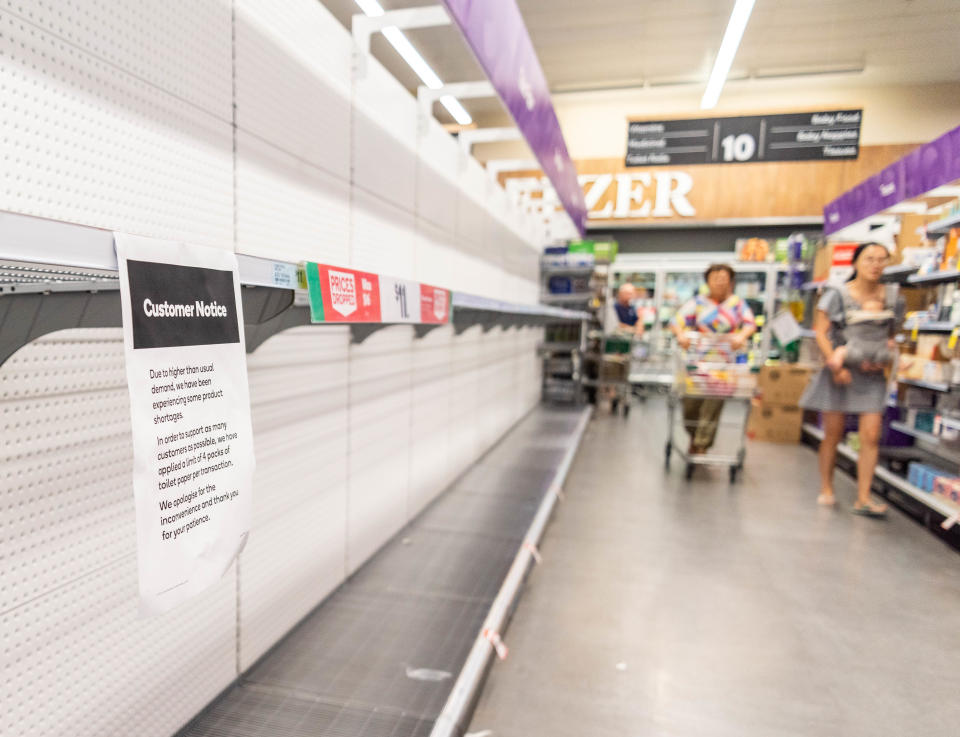
Professor Axel Bruns from the Digital Media Research Centre at Queensland University of Technology said it’s possible we’re dealing with a “feedback loop” too.
“Rumours about shortages may circulate via social media and lead to some panic buying, which is then reported and amplified by the mainstream media, and this then leads to even more social media discussion (which is now validated by the media coverage),” Professor Bruns said.
“We may never know exactly what triggered all this; it could be as simple as a supermarket somewhere genuinely restocking its toilet paper shelf, and this being misunderstood (and subsequently shared on social media) by a shopper as a sign of a supply chain crisis – much in the same way that a single car braking on the freeway can end up causing a major traffic jam.”
Professor Bruns added if he were to point the finger at anyone it would be both journalists and social media users.
“Both journalists and social media users may have kept covering and sharing these stories mainly because they’re so obviously crazy, but in doing so they will also have heightened the concerns of ordinary people who are already worried about the impact of a pandemic threat they barely understand, and who are now projecting those indistinct fears onto a single tangible commodity – toilet paper,” he said.
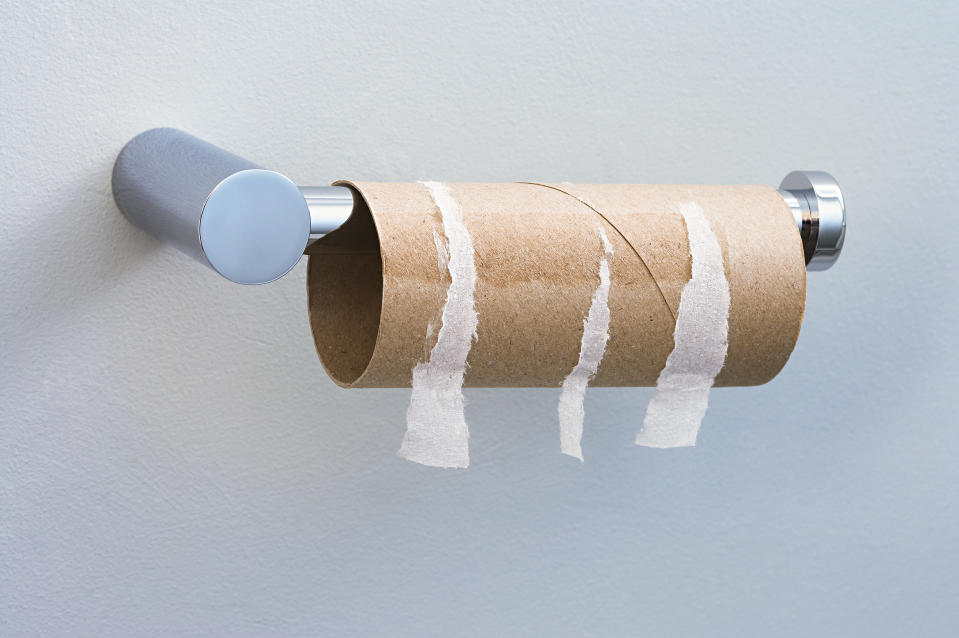
Why do people stockpile toilet paper?
Western Sydney Local Health District’s acting executive director of mental health Professor Bill Brakoulias told The Pulse, a health news site, that people are displaying hoarding behaviours.
He compared it to the behaviour of squirrels putting away acorns for the winter.
“When people get anxious they have what’s called ‘catastrophic cognitions’ – they think of the worst case scenario – and one way of controlling this anxiety is to collect things and keep things in order to feel safe,” he told the publication.
Professor Brakoulias added it’s also “a lot more obvious” when toilet paper isn’t in stock in supermarkets because it normally takes up a lot of space on shelves.
“This makes people want to get their packet in case they completely run out,” he said.
“The desire for toilet paper is also linked to Freudian psychology – people are focusing on the needs of their bodily functions because they are anxious.”
Monkey see, monkey do
People also copy each other.
Dr Rachael Sharman, a senior lecturer in psychology at University of the Sunshine Coast, said she’s witnessed how the fiasco is affecting retailers first-hand after going to Costco.
“The cashier was quite stressed - he said they'd been hammered with panic buying and very stroppy customers when they found no toilet paper in the building,” Dr Sharman said.
“In essence this panic is down to social contagion or ‘monkey see, monkey do’.”
“Basically you see someone stocking up on toilet paper, and you think they must know something you don't, so you replicate their behaviour.”
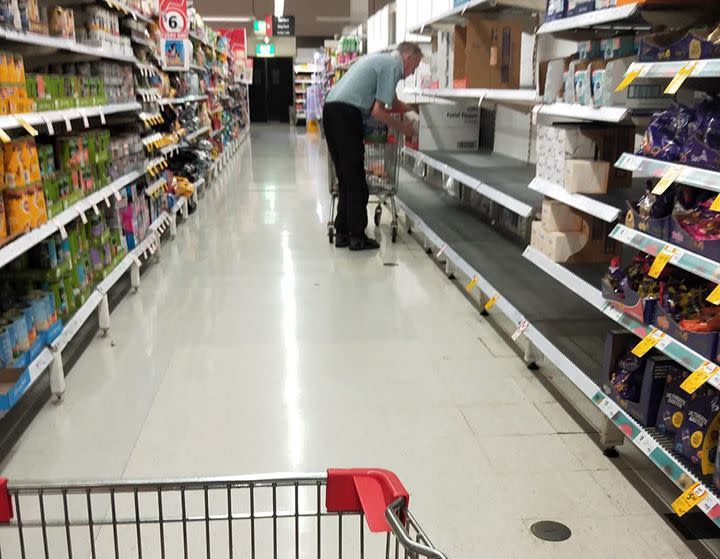
She added that social media and “dumbed-down news sources” also increase the panic.
“I mean, sure, there's some sense in stocking up on supplies in the event of a 14-day quarantine, but I would have thought chemist supplies (Panadol and any of your required medications) would have been a more obvious focus,” Dr Sharman said.
Will Coles and Woolworths run out of products amid coronavirus 'panic buying hysteria'?
'The perfect product': The reason people are panic buying toilet paper
Fear of Missing Out
Dr Sharman said the fact there are also people now desperately in need of toilet paper due to the shortage in supermarkets, such as the elderly, is leading to a “secondary surge”.
“It's human instinct to ‘mirror’ others, in fact we have ‘mirror neurons’ in our brain that are particularly important in child development (imitation, modelling etc),” she said.
“From a survival point of view, if everyone started walking rapidly out of their offices downstairs right now I would initially most likely copy them thinking I'd missed a fire alert or something similar.”
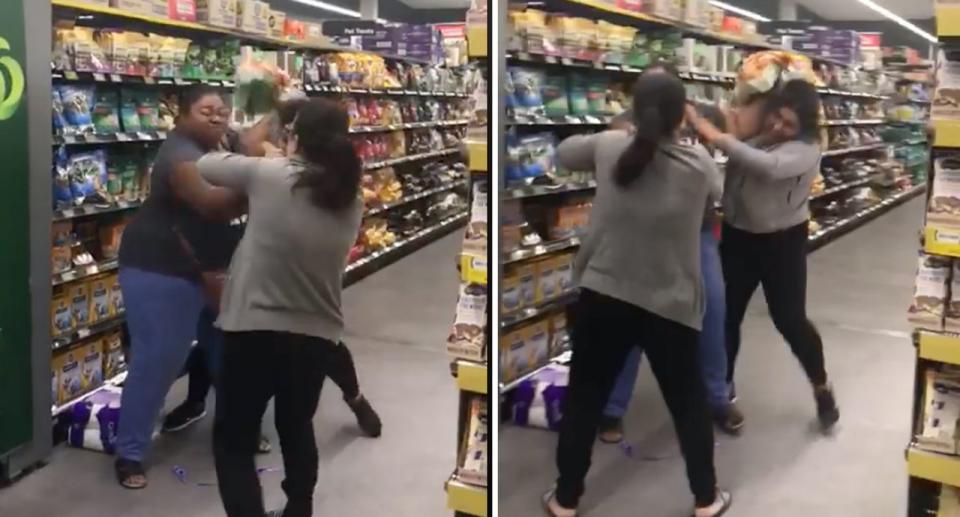
FOMO or fear of missing out is “also in operation” here with social media playing a hand in it, Dr Sharman said.
“Social media encourages FOMO to run rampant in these situations,” she said.
“You realise others are stockpiling, you quickly perceive that there might therefore be a shortage, and so you start to stockpile yourself to ensure you don't miss out.”
The power of the media to influence millions
Professor Eric Louw, from University of Queensland’s School of Communication and Arts, said it’s also being caused by “journalistically driven ‘social panics’” and tied it between both news organisations and social media.
“What we are seeing is the development of a symbiotic relationship between journalists and social media,” Professor Louw said.
“Not only does this produce poor journalism but it also generates public hysteria because journalists spread social media messages by producing a kind of megaphone effect.”
Professor Louw added we’re seeing similar “social panic” to the bushfires over the summer.
He said “journalists need to recognise they have power – the power to influence millions” by “influencing how they see the world”.
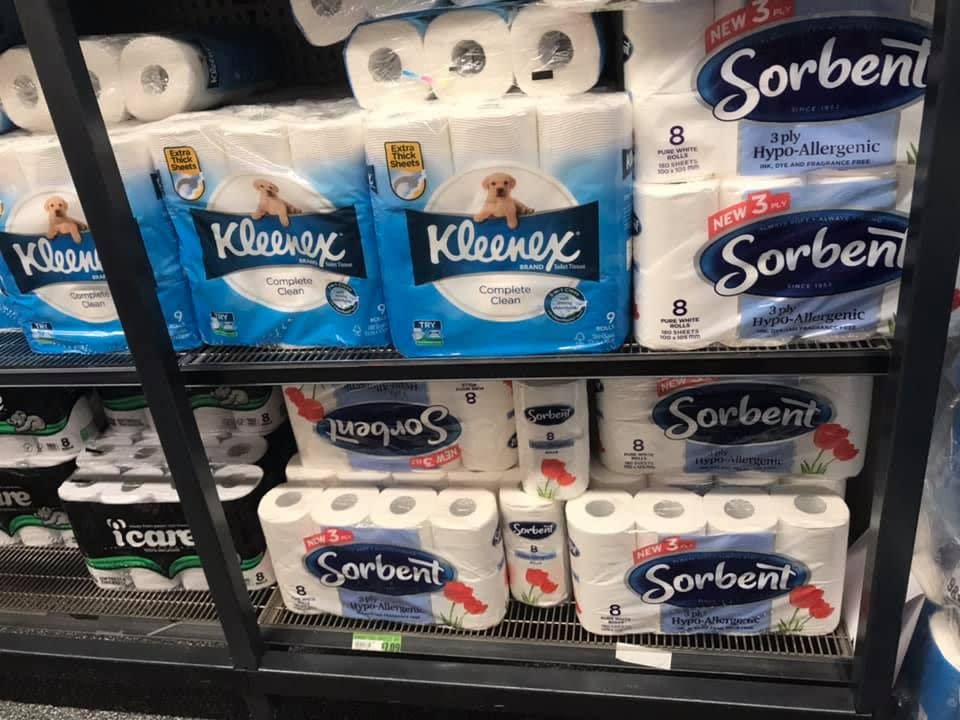
“This power should be exercised with responsibility,” Dr Louw said.
“Journalists should think twice before putting a story out and always first ask themselves ‘what harm might this story do’.”
The frenzy may be over as quickly as it started
As for when the toilet paper craze will end, an expert predicts it could be over soon.
Adam Ferrier, a consumer psychologist and one of the founders of advertising agency Thinkerbell, wrote in a column on Mumbrella the panic buying should end shortly.
Mr Perrier wrote most trends end at “about the same rate they start”.
“The quicker the rise, the quicker the fall,” he wrote.
“So here’s a prediction, for the record: The frenzy will be over as quickly as it started. I’ll give it ’til Friday.”
Do you have a story tip? Email: newsroomau@yahoonews.com.
You can also follow us on Facebook, Instagram and Twitter and download the Yahoo News app from the App Store or Google Play.





